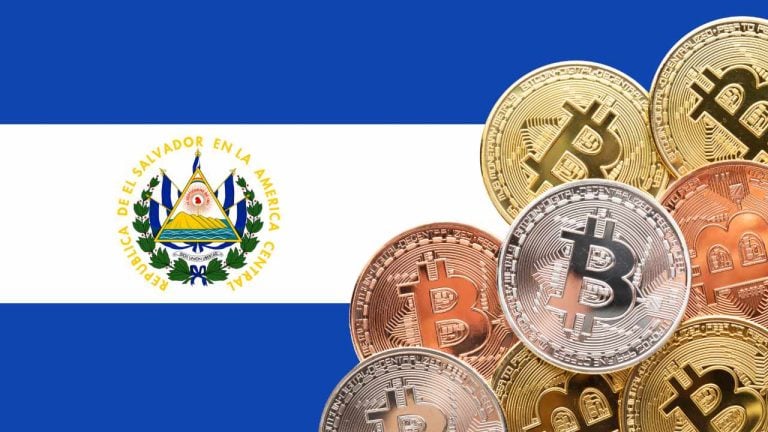
El Salvador's Bitcoin Law to Remain in Place
El Salvador Vice President Félix Ulloa has stated that bitcoin will continue to serve as legal tender in the country, even after the International Monetary Fund (IMF) urged them to drop the cryptocurrency. Despite the IMF's repeated calls, Ulloa emphasized that El Salvador remains committed to bitcoin and believes it has the highest level of credibility worldwide.
During an interview with Reuters, Ulloa confirmed that El Salvador's bitcoin law will remain intact throughout the second term of President Nayib Bukele. The IMF had urged the country to abandon bitcoin as legal tender during negotiations for a billion-dollar loan. However, Ulloa made it clear that the government has no intention of reversing its decision.
Ulloa also highlighted that the recent approval of spot bitcoin exchange-traded funds (ETFs) by the U.S. Securities and Exchange Commission (SEC) has strengthened El Salvador's resolve to continue embracing bitcoin. In September 2021, El Salvador became the first country to adopt bitcoin as legal tender alongside the U.S. dollar.
According to Ulloa, if President Bukele and his New Ideas party secure a significant victory in the upcoming general elections, El Salvador will move forward with its plans to launch bitcoin-backed bonds in the first quarter of 2024. In addition, the construction of Bitcoin City, a proposed tax-free crypto haven in eastern El Salvador, will proceed, and passports will be issued to investors contributing $1 million in cryptocurrency.
IMF Reiterates Concerns about Bitcoin as Legal Tender
Despite El Salvador's commitment to bitcoin, the IMF has once again urged the country to reconsider its decision. Following the IMF Executive Board's Article IV consultation with El Salvador, the Fund published a report stating that while digital means of payment, such as the Chivo e-wallet, could enhance financial inclusion, strict regulation and oversight are necessary.
The IMF directors emphasized the need to address the risks associated with the use of bitcoin on financial stability, financial integrity, and consumer protection. They specifically called for the removal of bitcoin's legal tender status, citing concerns about its impact on these areas and potential fiscal liabilities. The directors also expressed unease about issuing bitcoin-backed bonds.
This is not the first time the IMF has raised concerns about El Salvador's adoption of bitcoin as legal tender. Since November 2021, the Fund has consistently warned about the risks and costs associated with bitcoin, culminating in a detailed report in February 2023. Despite these warnings, El Salvador remains steadfast in its commitment to bitcoin.
El Salvador Stands Firm on Bitcoin
El Salvador's unwavering commitment to bitcoin has defied the IMF's repeated calls to drop the cryptocurrency as legal tender. The government's decision to maintain its bitcoin law is driven by the belief that bitcoin enjoys unparalleled credibility worldwide.
While the IMF has stressed the importance of financial inclusion and recognized the potential of digital means of payment, it continues to express concerns about the risks and costs associated with bitcoin. El Salvador, however, remains confident in its decision and sees bitcoin as a key element of its economic strategy.
As El Salvador prepares for the upcoming general elections, the country's commitment to bitcoin will be put to the test. If President Bukele and his New Ideas party secure a resounding victory, El Salvador will proceed with its plans to launch bitcoin-backed bonds and develop Bitcoin City as a hub for crypto investors.
In conclusion, El Salvador's defiance of the IMF's calls to drop bitcoin as legal tender reflects its unwavering belief in the potential of cryptocurrency. Regardless of the risks and concerns raised by the IMF, El Salvador remains committed to bitcoin and sees it as a crucial component of its economic future.
What are your thoughts on El Salvador's decision to reaffirm its commitment to bitcoin? Let us know in the comments section below.
Frequently Asked Questions
Can I have physical possession of gold within my IRA?
Many people are curious if they can possess physical gold in an IRA. This is a valid question as there is no legal route to it.
But if you carefully examine the law, there's nothing stopping you from owning gold in your IRA.
The problem is that most people don't realize how much money they could save by putting their gold in an IRA instead of keeping it in their own homes.
It is easy to toss gold coins, but it's not easy to place them in an IRA. If you decide that you want to keep your gold at home, you'll be responsible for two tax payments. Two taxes will be charged: one to the IRS, one to the state you live in.
You can also lose your gold and have to pay twice the taxes. Why would you want to keep your gold in your house?
You might argue that you need the security of knowing that your gold is safe in your home. To protect yourself from theft, store your gold somewhere that is more secure.
If you intend to visit often, don't leave your gold unattended in your home. Theft can easily take your gold when you're not home.
It is better to keep your gold in an insured vault. Your gold will be protected against fire, floods, earthquakes, and robbery.
You won't be responsible for paying any property tax if you store your gold in a vault. Instead, you'll have to pay income tax on any gains you make from selling your gold.
If you prefer not to pay tax on your precious metals, an IRA may be a good option. An IRA will allow you to avoid income tax while earning interest on your gold.
Capital gains tax is not a requirement for gold investments. You can cash out your entire investment anytime you wish.
And since IRAs are federally regulated, you won't have any trouble getting your gold transferred to another bank if you move.
Bottom line: You can have gold in an IRA. Only thing stopping you from owning gold in an IRA is your fear of getting it stolen.
What precious metals are permitted in an IRA
Gold is the most widely used precious metal for IRA account accounts. Gold bullion coins and bars are also available as investments.
Precious and precious metals are considered safe investments, as they don’t lose their value over the course of time. They are also a great way of diversifying your investment portfolio.
Precious metals include palladium and platinum. These metals share similar properties. Each metal has its own unique uses.
For example, platinum is used in making jewelry. Palladium is used to create catalysts. It is used for producing coins.
When deciding which precious metal to choose, consider how much you expect to spend on your gold. A lower-cost ounce of gold might be a better option.
You also need to think about whether your investment is private. If you do, you should choose palladium.
Palladium is more valuable than gold. It's also more rare than gold. You'll probably have to pay more.
When choosing between gold or silver, another important aspect is the storage fees. Storage fees for gold are determined by its weight. For larger quantities of gold, you will be charged a higher storage fee.
Silver is best stored in volumes. You'll pay less if you store smaller quantities of silver.
You should follow all IRS rules if you plan to store precious metals in an IRA. This includes keeping track, and reporting to the IRS, all transactions.
Are gold IRAs a good place to invest?
The best way to invest in gold is by buying shares in companies that mine for it. These companies are a great way to make money investing in precious metals like gold.
However, there are two drawbacks to owning shares directly:
Holding on to your stock for too many years can lead you to losing money. When stocks decline, they fall further than their underlying asset (like gold). This could mean that you lose money rather than making it.
Second, you may miss out on potential profits if you wait until the market recovers before selling. So you may need to be patient and let the market recover before you profit from your gold holdings.
However, if you want to separate your investments from your financial affairs, physical gold can still be a great investment option. A gold IRA will help protect your portfolio from inflation and diversify it.
Visit our website to learn more about gold investment.
Which is better: sterling silver or 14k-gold?
Sterling silver, which contains 92% pure sterling silver instead of just 24%, is a stronger metal than gold or silver.
Sterling silver is also known by the name “fine silver” because it is made up of a mixture from silver and metals like zinc, copper, and zinc.
Gold is usually considered to be extremely strong. It takes a lot of pressure to break it down. If you dropped an object on top to a gold piece, it would shatter into thousands rather than breaking into two halves.
However, silver isn't as strong and durable as gold. If you dropped something onto a sheet made of silver, it would most likely bend and fold easily without breaking.
Silver is used in jewelry and coins. Its value fluctuates based on demand and supply.
How can I withdraw from an IRA with Precious Metals?
If your account is with a precious metal IRA firm such as Goldco International Inc., you may want to consider withdrawing funds. When you sell your metals, the value of those funds will be higher than if it was kept in the account.
Here is how to withdraw precious metal IRA funds.
First, you need to find out if the provider of your precious metal IRA allows withdrawals. Some companies offer this option while others do not.
The second step is to determine if selling your metals will allow you tax-deferred gain. This benefit is offered by most IRA providers. Some IRA providers offer this benefit, but others don't.
Third, make sure to check with your precious metal IRA provider if there are any fees associated with these steps. It is possible that the withdrawal will be more expensive.
Fourth, keep track of your precious metal IRA investments for at least three years after you sell them. For capital gains to be calculated, wait until January 1, each year. Next, fill out Form 8949 to determine the amount you gained.
In addition to filing Form8949, you must also notify the IRS about the sale or purchase of precious metals. This ensures you pay tax on any profits from your sales.
Consider consulting a trusted attorney or accountant before selling your precious metals. They can help ensure you follow all necessary procedures and avoid costly mistakes.
Can I have gold in my IRA.
The answer is yes! Gold can be added to your retirement plan. Because it doesn't lose any value over time, gold is a great investment. It also protects against inflation. It is also exempt from taxes.
It's important to understand the differences between gold and other investments before investing in it. Unlike stocks or bonds, you can't buy shares of gold companies. They are also not available for sale.
Instead, you should convert your gold to cash. This means that it will be necessary to dispose of the gold. You cannot just keep it.
This makes gold different from other investments. As with other investments you can always make a profit and sell them later. This is not true for gold.
Worse, the gold cannot be used as collateral for loans. You may have to part with some of your gold if you take out mortgages.
What does this translate to? It's not possible to keep your gold for ever. It will eventually have to be converted into cash.
There's no need to be concerned about this right now. Open an IRA account. You can then invest in gold.
Statistics
- The IRS also allows American Eagle coins, even though they do not meet gold's 99.5% purity standard. (forbes.com)
- Silver must be 99.9% pure • (forbes.com)
- If you accidentally make an improper transaction, the IRS will disallow it and count it as a withdrawal so that you would owe income tax on the item's value and, if you are younger than 59 ½, an additional 10% early withdrawal penalty. (forbes.com)
- Depending on your financial situation, most experts recommend you invest no more than 5% to 10% of your retirement funds in precious metals. (forbes.com)
External Links
investopedia.com
kitco.com
forbes.com
- Gold IRA, Add Some Sparkle to Your Retirement Nest egg
- Understanding China's Evergrande Crisis – Forbes Advisor
en.wikipedia.org
How To
How to decide if a Gold IRA is right for you
Individual Retirement account (IRA), is the most widely used type of retirement plan. Individual Retirement Accounts (IRAs) are available through financial planners, banks, mutual funds and employers. Individuals are allowed to contribute up to $5,000 each year to IRAs without having to pay tax consequences. This amount can be deposited into any IRA, regardless your age. However, certain IRAs have limits on the amount you can deposit. For example, a Roth IRA contribution is not allowed if you are less than 59 1/2. If you're under 50, you must wait until you reach age 70 1/2 before making contributions. In addition, some people who work for their employer may be eligible for matching contributions from their employer.
There are two types of IRAs available: Roth and traditional. Traditional IRAs can be used to invest in stocks or bonds, as well other investments. Roth IRAs are only available for after-tax dollars. Roth IRA contributions don't get taxed as soon as they are made. However, withdrawals from a Roth IRA will be taxed again. Some people prefer to combine these two accounts. Each type has its advantages and disadvantages. So what should you consider before deciding which type of IRA works best for you? These are the three main things you need to remember:
Traditional IRA Pros
- There are many options for contributing to your company.
- Employer match possible
- Can save more than $5,000 per person
- Tax-deferred Growth until Withdrawal
- May have restrictions based on income level
- The maximum contribution limit is $5,500 per year ($6,500 if married and filing jointly)
- The minimum investment is $1,000
- After age 70 1/2, you must begin taking mandatory distributions
- You must be at the least five years of age to open an IRA
- Cannot transfer assets from IRAs
Roth IRA pros
- Contributions do not attract taxes
- Earnings increase tax-free
- Minimum distribution not required
- Investment options are limited to stocks, bonds, and mutual funds
- There is no maximum contribution limit
- There are no limitations on the ability to transfer assets between IRAs
- Age 55 or older to open an IRA
If you are thinking about opening an IRA, it is important to be aware that not all companies offer exactly the same IRAs. For example, you might be able to choose between a Roth IRA (or a traditional one) from some companies. Others offer the possibility to combine them. Noting that different types IRAs have different requirements, it's worth noting. Roth IRAs have no minimum investment requirements, while traditional IRAs require a minimum $1,000 investment.
The Bottom Line
When you are choosing an IRA, it is crucial to consider whether you will pay taxes now or in the future. If you are retiring within ten year, a traditional IRA could be the right option. A Roth IRA might be better suited to you. In either case, it's a smart idea to speak with a professional about your retirement plans. A professional can help you determine the best option for your situation and keep track of what's going on in the market.
—————————————————————————————————————————————————————————————-
Based on [POSTTITLE]
by [POSTAUTHOR]
















